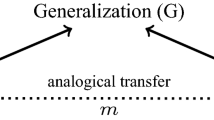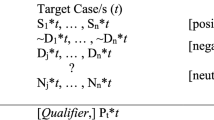Abstract
Analogical reasoning can be understood as a kind of resemblance of one thing to another, thus assigning properties from one context to another. The key idea is to use similarity information to support an inference which cannot be deductively inferred. In this paper, we present a formal and intuitive framework of this phenomena using an argument-based logic-programming-like language. A proof theory of our system is stated in the dialectical style, where a proof takes the form of dialogue between a proponent and an opponent of an argument. We also discuss how the proposed framework can be fine tuned for optimistic analogical reasoning and pessimistic analogical reasoning. Finally, we discuss a design sketch of our proposed analogical reasoner called Analogist.
Similar content being viewed by others
Notes
- 1.
- 2.
When \(x = 1\), we may remove it.
- 3.
When \(w = 1\), we may remove it.
- 4.
The precise definition of t-norm is given later.
- 5.
We may employ the notion of \(\overset{\pi }{\sim }_\mathcal {T} \) to obtain 0.8 from realistic ontologies.
- 6.
Later, this definition is used by Definition 11 for comparing between rebuttal attacks.
- 7.
For the sake of succinctness, \(\cdot ^\mathsf {D}\) (and \(\cdot ^\mathsf {S}\)) indicates a duplicated set of defeasible rules (and similarity rules, respectively) from a specified argument structure.
References
Lief, M.S., Caldwell, H.M., Bycel, B.: Ladies and Gentlemen of the Jury: Greatest Closing Arguments in Modern Law. Scribner, New York (2000)
Hofstadter, D., Mitchell, M.: Concepts, analogies, and creativity. In: Proceedings of CSCSI 1988, pp. 94–101, June 1988
Walton, D., Reed, C., Macagno, F.: Argumentation Schemes. Cambridge University Press, Cambridge (2008)
Waller, B.N.: Classifying and analyzing analogies. Informal Logic 21(3), 199–218 (2001)
Haraguchi, M., Arikawa, S.: Reasoning by Analogy as a Partial Identity between Models. Springer, Heidelberg (1987). pp. 61–87
Greiner, R.: Learning by Understanding Analogies. Springer, Boston (1986). pp. 81–84
Winston, P.H.: Learning and reasoning by analogy. Commun. ACM 23(12), 689–703 (1980)
Goebel, R.: A Sketch of Analogy as Reasoning with Equality Hypotheses. Springer, Heidelberg (1989). pp. 243–253
Dung, P.M.: On the acceptability of arguments and its fundamental role in nonmonotonic reasoning, logic programming and n-person games. Artif. Intell. 77(2), 321–358 (1995)
Racharak, T., Tojo, S., Hung, N.D., Boonkwan, P.: Argument-based logic programming for analogical reasoning. In: Proceedings of the 10th International Workshop on Juris-Informatics (JURISIN), pp. 73–86, November 2016
Racharak, T., Suntisrivaraporn, B., Tojo, S.: Identifying an Agent’s Preferences Toward Similarity Measures in Description Logics. Springer International Publishing, Cham (2016). pp. 201–208
Racharak, T., Suntisrivaraporn, B., Tojo, S.: \(\sf sim^{\pi }\): a concept similarity measure under an agent’s preferences in description logic \(\cal{ELH}\). In: Proceedings of the 8th International Conference on Agents and Artificial Intelligence, pp. 480–487 (2016)
Nute, D.: Handbook of Logic in Artificial Intelligence and Logic Programming, vol. 3, pp. 353–395. Oxford University Press Inc, New York (1994)
Antoniou, G., Billington, D., Governatori, G., Maher, M.J.: Representation results for defeasible logic. ACM Trans. Comput. Logic 2(2), 255–287 (2001)
Amgoud, L., Cayrol, C.: On the acceptability of arguments in preference-based argumentation. In: Proceedings of the 14th Conference on Uncertainty in Artificial Intelligence, UAI 1998, San Francisco, CA, USA, pp. 1–7. Morgan Kaufmann Publishers Inc. (1998)
Elvang-Gøransson, M., Krause, P.J., Fox, J.: Acceptability of Arguments as ‘Logical Uncertainty’. Springer, Heidelberg (1993). pp. 85–90
García, A.J., Simari, G.R.: Defeasible logic programming: an argumentative approach. Theory Pract. Log. Program. 4(2), 95–138 (2004)
Prakken, H., Sartor, G.: Argument-based extended logic programming with defeasible priorities. J. Appl. Non-classical Logics 7, 25–75 (1997)
Damele, G.: Analogia Legis and Analogia Luris: An Overview from a Rhetorical Perspective. Springer International Publishing, Cham (2014). pp. 243–256
Ashley, K.: Case-Based Reasoning. Springer, Netherlands (2006). pp. 23–60
Aleven, V.: Teaching case-based argumentation through a model and examples (1997)
Prakken, H., Wyner, A.Z., Bench-Capon, T.J.M., Atkinson, K.: A formalization of argumentation schemes for legal case-based reasoning in ASPIC+. J. Log. Comput. 25(5), 1141–1166 (2015)
Acknowledgments
This research is supported by JAIST, NECTEC, and SIIT under the dual doctoral degree program; and is partly supported by CILS of Thammasat University and the NRU project of Thailand Office of Higher Education Commission.
Author information
Authors and Affiliations
Corresponding author
Editor information
Editors and Affiliations
Rights and permissions
Copyright information
© 2017 Springer International Publishing AG
About this paper
Cite this paper
Racharak, T., Tojo, S., Hung, N.D., Boonkwan, P. (2017). Argument-Based Logic Programming for Analogical Reasoning. In: Kurahashi, S., Ohta, Y., Arai, S., Satoh, K., Bekki, D. (eds) New Frontiers in Artificial Intelligence. JSAI-isAI 2016. Lecture Notes in Computer Science(), vol 10247. Springer, Cham. https://doi.org/10.1007/978-3-319-61572-1_17
Download citation
DOI: https://doi.org/10.1007/978-3-319-61572-1_17
Published:
Publisher Name: Springer, Cham
Print ISBN: 978-3-319-61571-4
Online ISBN: 978-3-319-61572-1
eBook Packages: Computer ScienceComputer Science (R0)




